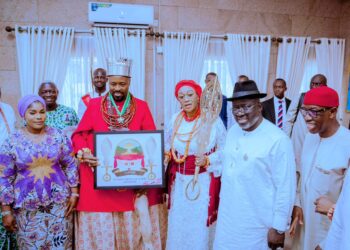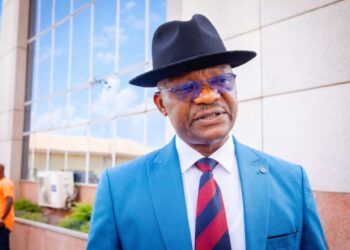22 June 2023
The stage seems to be set for a more complex minimum wage negotiation process as the Revenue Mobilisation Allocation and Fiscal Commission (RMAFC) has proposed to raise the salaries of public office holders by 114 per
According to the review, President Bola Tinubu’s monthly emolument would increase from N3.515 million to N8.013 million. Those of the Vice President, governors and lawmakers would also increase accordingly.
Already, economists are recommending N60,000 minimum wage to reduce the disparity in the take-home between public and civil servants, whose incomes have been wiped out by fast-rising inflation.
From 2009 when the current consumer price index (CPI) was set, the general monthly price index has increased by 510 per cent, from 90.2 points to 547.5 points.
Sadly, the national minimum wage has only increased by 300 per cent in the same period, moving from N7,500 to N30,000. In dollar terms alone, Nigerian workers earned more back then than now, with high inflation also doing significant damage to household income.
There is an ongoing negotiation for minimum wage review with organised labour demanding N200,000. The government has not made an offer but advanced what it called cost of living allowance to cushion the effect of subsidy removal on income with the total estimated spending pegged at N702 billion.
While there has been no reasonable progress on the discussion, RMAFC disclosed the review of public officials’ already bloated salaries by 114 per cent on wednesday, an announcement that has triggered outrage from civil society and labour.
RMAFC explained that elected public officers have not had a raise in their emoluments since 2007.
In a calm yet angry tone, the immediate past General Secretary of the Nigeria Labour Congress (NLC), Dr. Peter Ozo-Eson, dismissed the argument of 17 years of non-revision of elected public officers’ pay.
He argued that in 2007, the wages of the elected public were already among the highest in the world, which distorted the Nigerian wage structure.
He explained that RMAFC, National Income Wages and Salaries Commission (NIWSC) and Collective Bargaining Agreements (CBAs) have been made non-effective by the distortions, saying: “There is complete dissociation between what the RMAFC does for the so-called public officers and what the other income determination mechanisms do either through the national salaries and income wage commission or what the collective bargaining does for the rest of the public sector and the private sector.”
He held that the widening gap between what is paid to elected public servants and what is paid to civil servants has been responsible for the clamour for wage increases in the country.
While lampooning the kleptocratic nature of some Nigerian elected public officers, Ozo-Eson submitted that studies have shown that at the level of international comparison what is being paid to the Nigerian public officers outstrips what is paid to many other countries’ officials.
Given the harsh economic policies this government has introduced that have eroded the pay of workers significantly, raising workers’ pay was a chance to bridge the gap between elected officers and other workers in the country.
Ozo-Eson said: “The situation we had was that the remunerations of elected officers were set higher than the prevailing wage structure relative to the rest of the economy. Even if we had had reviews of the minimum wage twice or more within the period, it is still far short of what those levels are and that is what has been responsible for the continued clamour that we need to bring the salary structure to be in line with what is realistic.”
Proffering solutions to the intractable wage structure question, he urged that government, at all levels, labour unions and employer bodies to develop a just and sustainable system.
His words: “I think what needs to be done is to sit down and do a proper alignment of what the compensation for the whole economy should look like. Doing a percentage review when there is a completely misaligned structure will not address the problem. We will continue to have a situation in which elected public officers’ pay will continue to be out of alignment with the rest of the economy and that will continue to act as a catalyst for unstable remuneration demands in the rest of the economy.”
Also, Assistant General Secretary of the NLC, Chris Onyeka, said the move was a gang-up and a height of deceit by the government against Nigerian workers.
Analysing the figures, he said: “Looking at the base that they are increasing by 114 per cent against their humongous salaries and 30,000 for civil servants. 114 per cent of their base will run into millions and if you increase N30,000 minimum wage by 114 per cent, it will increase to N65,000. That is why we are asking for an increment in quadruples. If we want to make something tangible for us, the minimum wage should be around N250,000, which is about $300 monthly.
“What is $300 compared to the cost of living comparatively? We are talking about what will take Nigerian workers home. We must reduce the cost of governance to free resources.
“Governors do not need their salaries to be increased for now because they do not touch their salaries.”
First Deputy President of the Trade Union Congress of Nigeria (TUC), Dr. Tommy Okon, said the government has set a template for their negotiation and discussions for increased allowances. He said the government has set a standard and they would follow suit.
He said by Monday when the Presidential Proposal Steering Committee would meet, labour would also review their demands and table them according to what has been submitted.
Okon, who is also the National President of the Association of Senior Civil Servants of Nigeria (ASCSN), said there should be no cause for alarm or outrage but for them to follow accordingly.
He said when the time comes for negotiations for the review of the national minimum wage, they’ll also follow suit as the government has set the template.













